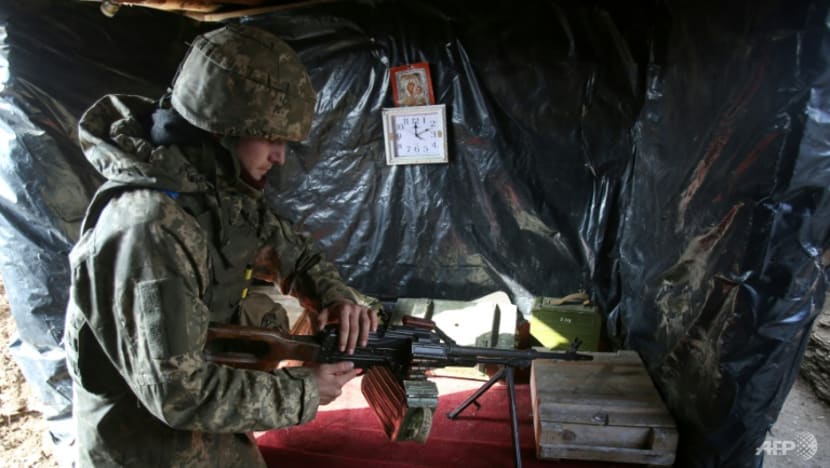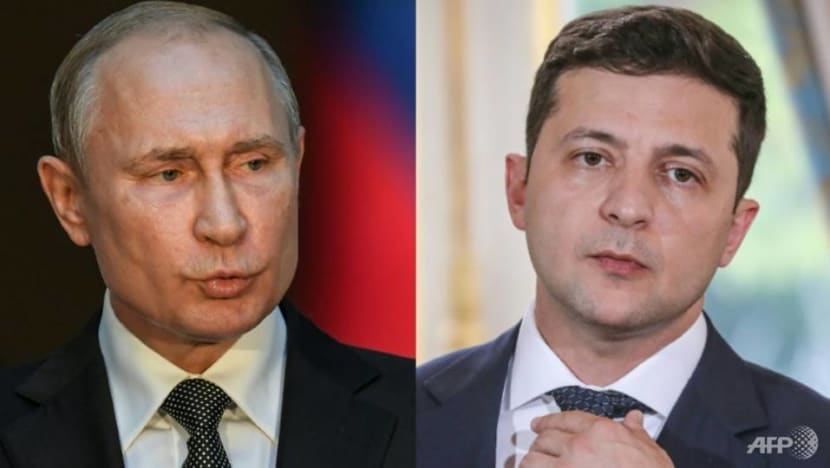Alexander Hill
09 Mar 2022

CALGARY, Canada: There have been few positives to report regarding the war in Ukraine since the beginning of Russia’s invasion of the country, but Vladimir Putin’s latest offering of Russian peace terms is cause for muted optimism.
The Russian invasion is not going according to plan, and at least Putin wants to talk. He’s demanding four things.
[If the invasion had gone according to plan, then Putin would not want to talk...]
The first two are that Ukraine ceases military action — one assumes as part of a wider ceasefire — and changes its constitution to enshrine neutrality, likely meaning that it must pledge to stay out of NATO.
Putin is also demanding that Ukraine and the West acknowledge Crimea as Russian territory and recognise the separatist republics of Donetsk and Luhansk as independent states.
If there is to be a meaningful peace, then we need to put aside — to a very limited extent at least — just how abhorrent the invasion is and focus on negotiating. Putin should not be let off the hook, but the realities of the situation cannot be ignored.
There’s no question that the ferocity of the Ukrainian resistance — and Western solidarity in the face of Russian aggression — are both positive developments. But let’s examine why these factors aren’t as positive as they might seem.
UKRAINE FIGHTS ALONE
The reality on the ground is that unless NATO is willing to engage in open war with Russia, Ukraine is fighting alone against the Russian forces.
NATO is certainly inching towards a situation that will make its claims that it’s not at war with Russia seem a little hollow. The intention to provide Polish Soviet-era fighter aircraft to Ukraine takes us one step closer to a wider war.
Who will fly those jets into Ukraine? If Ukrainian pilots do, then they are operating from NATO bases, but if Polish pilots do, then are they participants in the war? Few in the West or Russia want open war between NATO and the Russians.
For the West to get even more deeply involved militarily would undoubtedly open the door to a much wider war, one that would dramatically increase the possibility that nuclear weapons will be used.
The current Ukraine crisis simply cannot be allowed to morph into the Third World War or a conflict in which the West’s end game is Putin’s “unconditional surrender”.
Even if he’s sabre-rattling to instil fear, Putin’s hints at the possible use of nuclear weapons must not simply be dismissed, because the stakes are too high.
PUTIN WILL NOT BACK DOWN
I’ve already argued that Putin won’t back down without some sort of win.
Consequently, if things carry on as they are, then the result will eventually be diplomatic discussions about just the sort of terms that Putin has put forward — but after countless additional deaths and unimaginable suffering in Ukraine.
The likelihood of Ukraine fighting Russia to the point at which Putin is willing to drop any demands is still extremely low, no matter how many weapons the West provides Ukraine. There’s a chance that Putin will be overthrown, but at this moment in time, that too is unlikely.
Putin has more support in Russia than many Western commentators seem willing to admit and currently has a firm hold of the reins of power.
A long, drawn-out war and the impact of sanctions will drain Russian support for Putin’s war, but we shouldn’t underestimate the strength of Putin’s resolve or patriotic elements within Russia.
I’ve already argued that Putin won’t back down without some sort of win.
Consequently, if things carry on as they are, then the result will eventually be diplomatic discussions about just the sort of terms that Putin has put forward — but after countless additional deaths and unimaginable suffering in Ukraine.
The likelihood of Ukraine fighting Russia to the point at which Putin is willing to drop any demands is still extremely low, no matter how many weapons the West provides Ukraine. There’s a chance that Putin will be overthrown, but at this moment in time, that too is unlikely.
Putin has more support in Russia than many Western commentators seem willing to admit and currently has a firm hold of the reins of power.
A long, drawn-out war and the impact of sanctions will drain Russian support for Putin’s war, but we shouldn’t underestimate the strength of Putin’s resolve or patriotic elements within Russia.
So whether western and Ukrainian leaders like it or not, there are going to have to be serious discussions with Putin’s government with the aim of not only ending the war but of creating lasting and sustainable peace.
PUTIN’S TERMS ARE NOT OUTRAGEOUS
Turning to the substance of Putin’s terms for peace, there are few surprises.
Some sort of ceasefire has to be a part of serious negotiations, although a blanket ceasefire should only be agreed upon if both sides show signs of willingness to enter serious negotiations.
Otherwise, a ceasefire would simply allow both sides to consolidate their positions and ultimately increase the human cost of the war.
Then there is the demand for Ukrainian neutrality when it comes to NATO.
NATO’s eastward expansion has been a long-term Russian concern. Concessions on that front before the war may even have averted it. Ukraine’s right to join NATO has to be balanced against wider European security.
There’s no reason why Ukraine cannot stay out of NATO and be armed and funded by the West in order to give it a robust defensive capability for the future.
Putin will not be expecting to get his own way on all of the points he has put forward, and giving ground on the issue of NATO expansion is a relatively easy and cost-limited way for the West and the Ukrainian government to show that they are serious about negotiations.
Turning to the substance of Putin’s terms for peace, there are few surprises.
Some sort of ceasefire has to be a part of serious negotiations, although a blanket ceasefire should only be agreed upon if both sides show signs of willingness to enter serious negotiations.
Otherwise, a ceasefire would simply allow both sides to consolidate their positions and ultimately increase the human cost of the war.
Then there is the demand for Ukrainian neutrality when it comes to NATO.
NATO’s eastward expansion has been a long-term Russian concern. Concessions on that front before the war may even have averted it. Ukraine’s right to join NATO has to be balanced against wider European security.
There’s no reason why Ukraine cannot stay out of NATO and be armed and funded by the West in order to give it a robust defensive capability for the future.
Putin will not be expecting to get his own way on all of the points he has put forward, and giving ground on the issue of NATO expansion is a relatively easy and cost-limited way for the West and the Ukrainian government to show that they are serious about negotiations.
 |
| While Russia and Ukraine are currently engaging in multiple rounds of peace talks, neither side has shown significant willingness to budge from its demands. (Photo: AFP/Tiziana Fabi, Ludovic Marin) |
THE GREY BARGAINING AREAS
More sticky is the question of territory — the recognition of Russian sovereignty over Crimea and independence for the separatist regions of Donetsk and Luhansk.
Russia is not going to hand Crimea back to Ukraine, but there may be more scope for negotiation surrounding the separatist regions.
Under the Minsk Agreements of 2014-15, those regions were supposed to gain more autonomy within Ukraine — and here Putin might be compelled or encouraged to give ground.
The West can also introduce new elements to the discussion — what about, for example, some sort of Russian payment in cash or kind for damage caused in Ukraine and a formal declaration on future non-interference in Ukrainian affairs, for starters?
Putin’s terms should be seen as a starting point for meaningful discussion, something sadly lacking before the invasion.
The Russian invasion of Ukraine is a catastrophe and should be condemned in no uncertain terms. But we don’t live in a fantasy world of good and evil in which evil will always be vanquished and good will always prevail.
We live in a messy, complicated world in which effective diplomacy that saves lives requires giving and taking. I hope that the leaders of all involved in the current crisis realise just how high the stakes are.
[No, this is not justice. Evil is not going to be beaten into submission. Evil would in fact gain some concession. But it is a way to peace. And no other way is as feasible or probable.]
Alexander Hill is a Professor of Military History at the University of Calgary. This commentary first appeared in The Conversation.
No comments:
Post a Comment